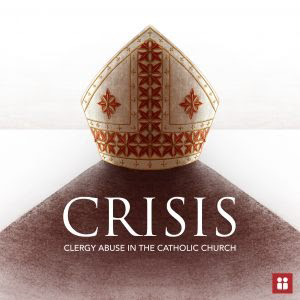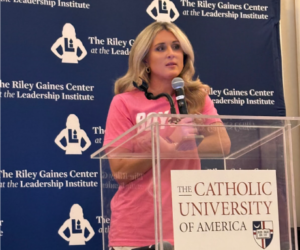New Catholic Project Podcast

Image Courtesy of The Catholic University of America
By Javi Mazariegos
On September 9, President John Garvey announced the release of the first episode of “Crisis: Sexual Abuse in the Catholic Church,” a documentary podcast of the Catholic Project. The podcast is a ten-part series documentary critically engaging with the facts of the Clergy Abuse crisis which has come to light since 2018.
The podcast is the primary educative initiative of the Catholic Project which is an initiative of The Catholic University of America to understand the Clergy Sex Abuse crisis with an eye towards providing light on moving forward and healing from its wounds. According to the Catholic Project’s webpage, “the work of The Catholic Project runs the gamut: from conferences, research, and developing educational resources, to bringing attention to the needs and perspectives of survivors, to promoting principles and best practices for preventing future crises.”
The project’s website reads, “when the current wave of the abuse crisis broke in the summer of 2018—with its epicenter in Washington, D.C.—President John Garvey decided it was fitting that The Catholic University of America should marshal its distinctive resources in a concerted response, for the good of the whole Church.”
The first episode of “Crisis” is titled “2018.” It details the outbreak of the news of the second major Church abuse scandal, the first being the crisis centered in Boston in 2002. Through interviews with members of the clergy, Church hierarchy, secular press, Church communications office, laity, and Catholic intellectuals, the episode explains the news of Cardinal Theodore McCarrick, and the Pennsylvania Grand Jury Report – the two major news stories from the summer of 2018.
In it, the host, a member of the University’s communications office, Karna Lozoya, tries to uncover the big “why” questions that both Catholics and non-Catholics alike have towards the shocking news. The podcast reflects upon these questions critically, professionally, and helpfully. It is particularly accessible for a listen, explaining the prominent issues clearly and with thorough background information.
This podcast is particularly important in highlighting the University’s engagement with the crisis. Fitting for the University, it is steeped in research, but offers a normative analysis of the problems that are discussed. It is altogether proper that the podcast sheds particular light on a very difficult issue because the Catholic University of America is at the heart of forming the hierarchy of the Catholic Church and also of determining an identity of the lay faithful in the United States.






